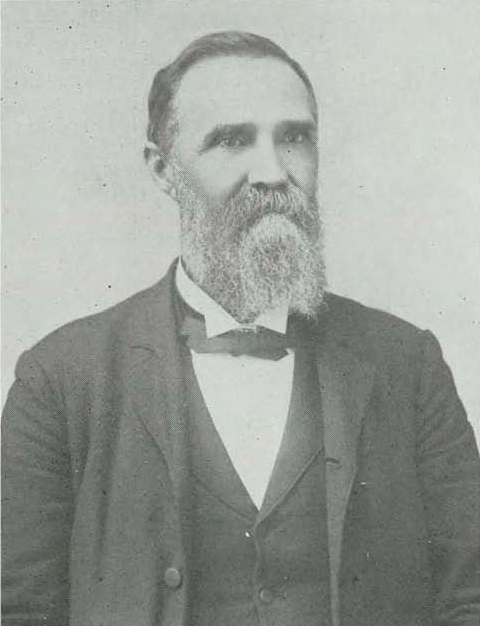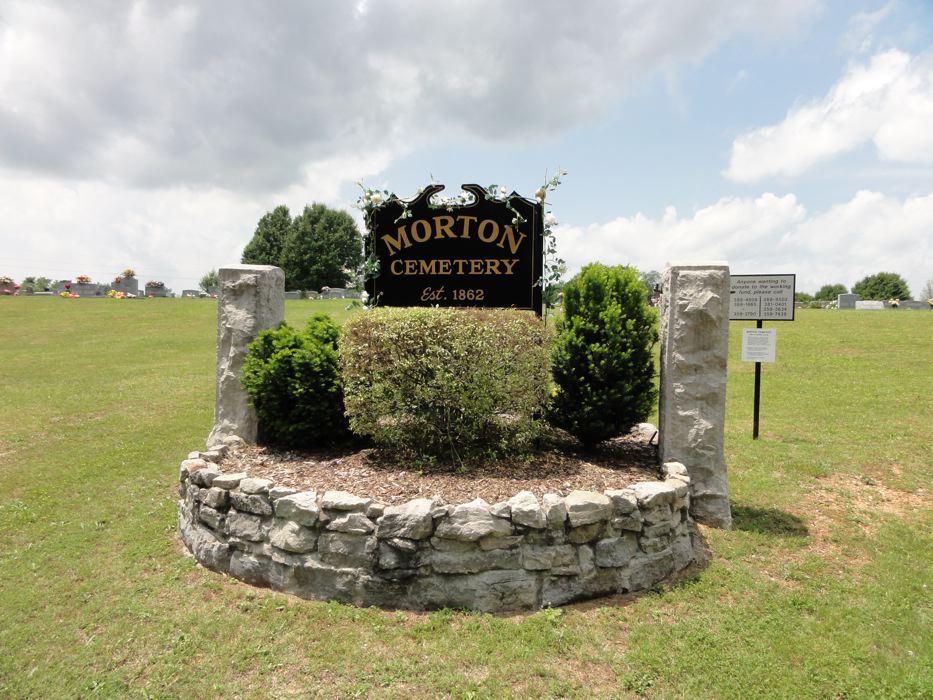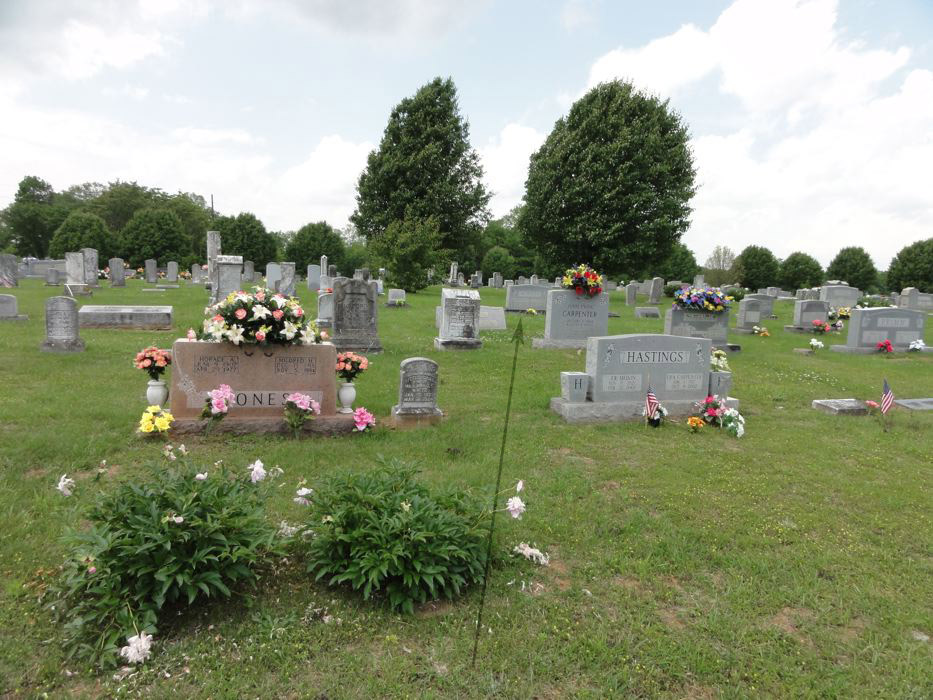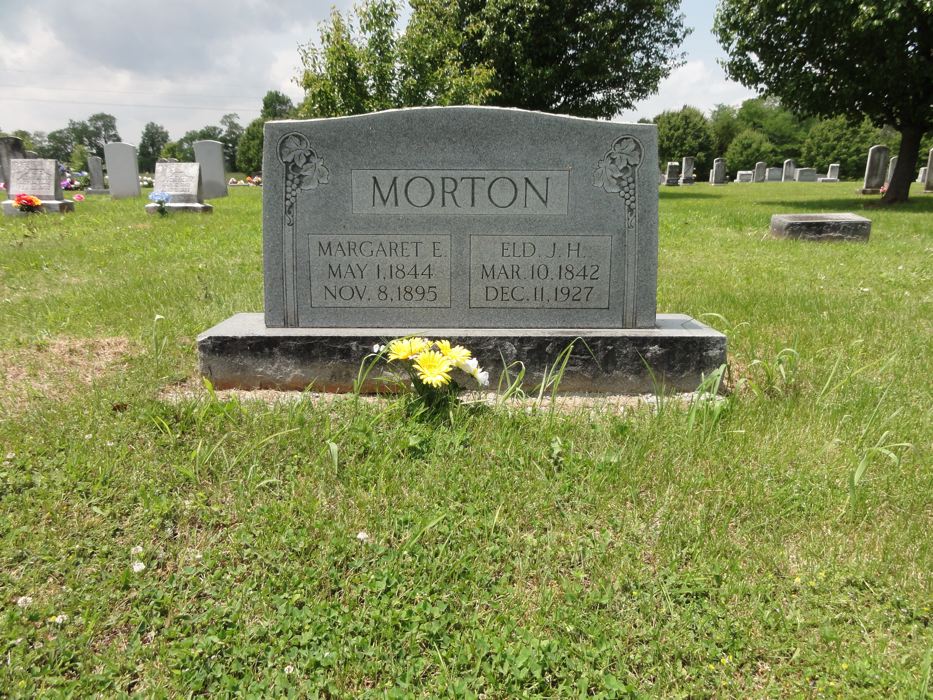James Hardison Morton
1842-1927
![]()
James H. Morton
Brother James H. Morton was born on March 10, 1842, in Marshall County, Tenn. He grew to manhood in the community in which he was born. Nature endowed him with splendid native ability, and, with the opportunities afforded him for mental development, he became a strong man intellectually, as well as physically. His education was as good as could be had in his section of the country at that time. He was married to Miss Marguerite Hardison on March 22, 1864. His wife was a sister of the late Dr. S. T. Hardison, of Lewisburg, TN. Twelve children were born to them and he struggled hard to provide the necessary things of life for his family and to give his children such education as could be afforded.
Brother Morton had a deep spiritual nature, and his piety furnished him the background for his usefulness in the kingdom of God. He became a Christian early in life and began preaching when he was twenty-five years of age, in 1867. He began preaching because he saw the need of the work and because he felt his obligation to God and the Lord Jesus Christ, who had redeemed him. He did not begin preaching merely as a profession, but for the service he could give in the name of Christ. His first sermon was preached at old Cedar Creek, in Maury County, TN. This church is now known as "Antioch." His first preaching was done on Sundays and monthly at different churches. He had the power of exhortation, as well as that of instruction. These two qualities combined made him a success in his field of activity.
Brother Morton was a great factor in building up the church at Lewisburg. He held a meeting there of sixteen days duration in 18?? which resulted in fifty-four additions. This gave the Lewisburg church great encouragement, and it has been a strong church since that time. In 1876, he held another meeting in Marshall County, at Beech Grove which resulted in seventy-four additions. He preached at Wilson Hill and strengthened the church there greatly. He established a church at Bluff Springs, in Marshall County, and also at Cornersville, TN. His first meeting at Cornersville resulted in twenty three additions. He established a church at Riggs Crossroads and encouraged the building of a meeting house there. He preached at Cane Creek, Liberty Valley, Wilson's Academy, Berea, Ostella and Cedar Dell. Al each of these places he either established a church or strengthened the little band of disciples that had already been gathered there.
In August 1868, Brother Morton and Brother W. T. Lee held a twelve days' meeting at Cathery's Creek in Maury County, which resulted in seventy-four additions. A strong church was established, which continues to this day faithful to the Lord. He strengthened the church at Beach Grove, in Maury County, and preached monthly for this church for about ten years. He preached under an arbor at Philadelphia and established a church, with about forty members set to worship after the New Testament pattern. He held meetings in Maury County at Antioch, Old Lasea, Mount Pleasant, Columbia, Beech Hill, Dark's Mill, New Lasea, Smyma, Campbell's Station, Bethel, Southport, Sharp's Corner, and Brown's Chapel. In addition to holding meetings for these churches, he preached in many schoolhouses, which resulted in three hundred and fifty baptisms. While in a meeting at Antioch he baptized the lamented J. C. McQuiddy.
He also preached extensively in Giles County, Tenn. He held meetings at Old Lynville, New Lynville, Big Creek, Blue Creek Rural Hill, Greenwood, Lock's Mill, Samuel's Mill, Odd Fellows' Hall Campbellsville Brick Church, Dry Branch, Cool Springs, and New Providence. He baptized more than two hundred persons in meetings at these places. He preached also in Lawrence County and Hickman County. He held a meeting at Old Dunlap in Hickman County, at the close of a debate which one of our brethren had held, and baptized forty-four persons. He baptized more than three hundred in Hickman County and a large number in Lawrence County, For twenty years he never held a meeting of eight days' duration at anyplace without baptizing some one. He never refused to go and preach the gospel where he had a call and seldom ever received more than ten dollars for an eight or ten days' meeting.
Brother Morton extended his labors into many other counties of Middle Tennessee. He began preaching in Lincoln County in 1870,and held meetings in that county at Macburg, Gum Springs, Stony Point, Friendship, Boone's Hill, Molina, Howell, Blanche, and Oak Grove. In the meetings at these points he baptized more than two hundred persons. He also held meetings in Bedford, Moore, Franklin, Warren, Rutherford and Williamson counties. His labors extended south into North Alabama, and he preached at Old Reunion, Bethel, Rocky Springs, and Bridgeport, AL. In 1896 he extended his preaching into Mississippi which resulted in a number of additions. In 1895 he made a trip to Texas and held a number of meetings. He visited Georgia and Florida and preached at many points in these States. He did work in nearly every county in Middle Tennessee.
In 1896 he began preaching in the mountains of Tennessee and Kentucky. He preached in McMinn, Bradley and Rhea counties in Tennessee and established churches in these counties. He hold meetings in Wayne County, in Kentucky and baptized seventy one persons. He held three meetings at Monticello which resulted in thirty one baptism's. He also labored in Pulaski, Casey, and Lincoln, counties. He did work in Clinton County also. He baptized ninety-two persons in Casey County and more than three hundred in Pulaski County. He held a meeting at Crab Orchard, on the spot where "Raccoon" John Smith preached his sermon on "Redemption" at the Baptist Association.
From the above facts and data we may know that Brother Mortons labors were many and his hardships too numerous to mention. At many of the places where he established congregations there are still strong congregations; yet at many places, like the churches mentioned in the New Testament, they have ceased to exist. Many of the congregations which Brother Morton started have now a new generation of disciples, and many of them do not know the sacrifice and service which he gave to establish those churches. These sketches are written that the younger generation may know of the godly men who labored and served in establishing churches and that due honor may be given to these heroes of the gospel.
Brother Morton was a lovable man, kind-hearted and sympathetic. He knew the word of God and loved it supremely. It was the joy of this soul to preach the gospel and persuade people to accept it. His success as a preacher, in a measure at least, was due to his power to persuade people to turn from the darkness of sin and accept Christ. His power to present the gospel to the people and his ability as an exhorter, together with the simple life which he lived, enabled him to bring many into the church.
Funeral services were held at Antioch Church by Brethren F. C. Sowell, J. S. Batey, and Newt Derryberry. His body was laid to rest in the Morton Cemetery, near his old home. He rests from his labors, but his works follow him.
-H. Leo Boles, Biographical Sketches of Gospel Preachers, c.1932, pages 322-326
![]()
James Hardison "Elder" Morton
Born 10 Mar 1842 in the Silver Creek community, near the Maury Co./Marshall Co. line, He died 11 Dec 1927 on Cedar Creek in the Leftwich Community. He was nineteen years old when the Civil War erupted and in April 1861, only days after the fall of Fort Sumpter he enlisted in the Army of the Confederacy. He served first in the 17th Tenn. Reg, Inf. and later in Gen. Nathan B. Forrest's Cavalry. He participated in battles at Thompson Station, Brentwood, Columbia and Chickamauga. We do not know the exact date of and reason for his release from the army but his discharge papers were signed by Gen. Forrest at Gainesville, Alabama. After the government extended the Pension Law to cover former Confederate veterans, James H. Morton received a modest stipend based on his service.
James H. Morton became one of the most widely travelled and most effective preachers the Church of Christ produced during his lifetime. He preached in various states, often being gone for weeks at a time. He conducted protracted meetings, preached in camp meetings under brush arbors and led groups of converts to organize local churches. He was widely recognized as one of the most powerful debaters, especially on religious subjects, in the area. In a day when local debating societies were an important part of community life he was constantly engaged in such activities. He kept a journal of his ministry and listed more than 5,000 persons who were added to the Church under his preaching.
-HARDISON AND ALLIED FAMILIES, MORTON FAMILY, page 572: A #9200.
![]()
Report in 1870 Issue of The Columbia Daily Herald
His account of the activities of the young minister: "Last Sunday was a week Rev. J. H. Morton, of Rock Springs country, went to Dunlap in Hickman Co., preached a sermon, and rode back home by 8 o'clock the same day, a distance of sixty miles. Last year he travelled about 3,500 miles, preached 255 discourses and had 368 accessioned to his church. Mr. Morton preaches at seven different places, the churches situated many miles apart, four in Giles (Rural Hill, Robertson's Fork, Lynnville, and Cave Spring), one in Hickman (Dunlap), one in Marshall (Wilson's Academy) and one in Maury (Cathey's Creek). Truly a remarkable man.
James Morton sold the home place (after his wife?s death) to his daughter Effie and husband Nim Check in the early part of this century but continued to reside in their household. It was here that he died on 11 Dec. 1927.
James was born March 10, 1842 in Marshall Co., TN. He married Margaret E. Hardison March 21, 1864 in Maury Co. TN. He fought in the Civil War for the Confederacy. After the war he was a farmer and a minister in the Church of Christ.
-THE COLUMBIA DAILY HERALD, Columbia, TN, 6 May 1870, by the Cedar Creek Columnist
![]()
Sketch From Columbia Daily Herald, July 6, 1974
Morton was a Church of Christ minister for 59 years, Shortly before his death in December 1927, he wrote a brief account of his years in the pulpit, entitled "Account of Labor..." His first sermon was delivered in 1867 at old Cedar Spring Church (now Antioch), and for the first twenty years I rode horseback to all my meetings and preached in schoolhouses, in brush arbors, and in groves under the shade of trees. "He received as much as ten dollars for holding an eight or ten-day meeting. In 1874 he preached to a crowd at Groveland under a brush arbor and the people were inspired to build a church here after this meeting. The church was named Philadelphia and his son William was also a preacher here for several years at a later date. Morton served Beech Grove Church near Spring Hill for ten years. During his last three or four years Morton was an invalid and unable to preach, but he looked back over his years as a minister with pride being especially proud that in almost sixty years he had never turned down a call to preach.
In this day of fast and comfortable travel it is hard for us to comprehend the difficulties Morton faced in his task of itinerate preacher.
-THE COLUMBIA DAILY HERALD, Columbia, TN, 6 Jul 1974, by Jill Garrett
![]()
The Columbia Daily Herald, About 1911
The home of Elder James H. Morton no longer stands on the banks of Cedar Creek as it was tom down a number of years ago. Located about 15 miles east of Columbia off the Sowell Mill Pike, It was a large commodious structure built on the site of an even earlier house. Here Morton and his wife, Margaret Hardison, made their home and raised a family of twelve children.
Morton was a Church of Christ minister for 59 years. Shortly before his death in Dec. 1927, he wrote a brief account of his years in the pulpit, entitled "Account of Labor and in it he recalled all the meetings he had conducted. (My count comes to over 3600 conversions during his career.) He wrote that he failed to remember preaching eight days at one place with no one confessing faith.
His first sermon was delivered in 1867 at old Cedar Spring church (now Antioch), and for the first twenty years I rode horseback to all my meetings and preached in schoolhouses, in brush arbors and in groves under the shade of trees. He also recalled that he rarely ever received as much as ten dollars for holding an eight or ten days meeting.
In 1874, he preached to a crowd at Groveland under a brush arbor and the people were inspired to build a church here after this meeting. The church was named Philadelphia and his son William was also a preacher here for several years at a later date. Morton served Beech Grove Church near Spring Hill for ten years.
During his last three or four years Morton was an invalid and unable to preach, but he looked back over his years as a minister with pride - being especially proud that in almost sixty years he had never turned down a call to preach.
He is buried in a family cemetery near his old home. Many remember the house as the Nim Cheek, as Cheek who had married Effie Morton, lived here for a number of years. The house was built about 1890.
Some family members believe that this land might have originally belonged to David Long, the soldier of the American Revolution, who was an ancestor of the Morton Family.
Long who has many descendants in Maury County, fought in the battles at Cowpens, Guilford Court House and King's Mountain, and was in Middle Tennessee as early as 1806. He died in 1845 in Marshall County and his name is one of those honored on a plaque in the Columbia Post Office.
Although the Morton home is gone, you can still ford the creek in front of the Old Morton homesite.
People kept referring to Philadelphia as Lickskillet, so I asked why, I wish I hadn't, as I was told that the people there were so poor they had to lick the skillet to live! Don't blame me for this one, it was told to me by a descendant of a skillet licker and, true or not, it does make a good tale.
They had twelve children.
-THE COLUMBIA DAILY HERALD, Columbia, TN, about 1911, by Jill Garrett
![]()
Another Notation From Hardison And Allied Families, Morton Family
Equally as notable in her own rite must have been Maggie Hardison Morton. She reared her twelve children often very much alone, and administered the family farm from which their living was taken. When her son, Anderson Morton, took sick with the dreaded typhoid fever in his adopted state of Texas, Maggie went by tram to care for him. He did not survive the disease however and she returned to Tennessee where within a year she too contracted the same ailment and died, 8 Nov 1895.
Mrs. Cunningham tells this about that sad occasion: 'our Uncle Wallace Hardison told a story of the night after her death. Elder Jimmy was away on a preaching mission, probably near Somerset, Kentucky. He took a train for Columbia as soon as he heard of his wife's serious illness. Uncle Wallace then a very young man, drove a buggy to meet the train. But as Grandpa stepped down from the train into a dark chilling November rain, Uncle Wallace had to tell him his beloved Maggie had died that day.
MORTON, Maggie - Memorial services for Maggie Morton held Sun. at Leftwich; paper dated 16 April, 1896.
-HARDISON AND ALLIED FAMILIES, MORTON FAMILY, pg 572
![]()
Gospel Advocate Obituary For Margaret E. Morton
We have just received the sad intelligence that Sister James H. Morton is dead. Brother Morton asks that we write an obituary. Just what we ought to say is the question. A few weeks ago Brother Morton, who has been in quite feeble health for two years, bade adieu to his devoted family for a trip through Texas, thinking it would be beneficial to him physically, and that he might accomplish some good for the cause of Christ. All were in good health when he left. It was our privilege to be with the brethren in a meeting near their home in July. Sister Morton was then the picture of health.
Just a few days after Brother Morton reached Texas he received a letter stating that Sister Morton was sick of typhoid fever, but for him to stay for his own good—she was doing well; in case any serious change should come they would notify him. Brother Dr. S. T. Hardison, her brother and attending physician, wrote Brother Morton at Italy, Texas, that his wife had grown worse, and he had better return home at once. Brother Morton being away preaching, failed to get this letter. On the 8th November a dispatch reached him announcing that Maggie had crossed over the river. A dispatch was returned stating that Brother Morton would take the first train—not to bury until he arrived. Missing connection at Greenville delayed him twelve hours. On arriving home all that was mortal of his devoted companion had been placed to rest in the old family burying ground, and there were only broken-hearted, motherless children to meet and greet papa.
Margaret E. Hardison was born May 1, 1844; married to J. H. Morton, March 22, 1864, and died Nov. 8, 1895, aged 51 years, 5 months, and 7 days. She obeyed the gospel thirty-five years ago at Old Cedar Creek (now Antioch). She leaves eleven children living—one died a short while ago in Texas—five married and six still at home, two brothers (Brother T. C. Hardison and Dr. S. T. Hardison), one sister (Mrs. M. R. Fox), a host of brethren, relatives, and friends to mourn her departure. Sister Morton was a devoted wife and mother, ready to make any sacrifice for their good. Above all she was devoted to the cause of her Redeemer—always willing to undergo any privation for the upbuilding of the cause—remained at home in care of her children while her husband was away week after week proclaiming the gospel to the people. She was indeed an helpmeet. But she has gone to her reward. “The sweetest and dearest, alas, cannot stay!
May our dear brother and his dear children be enabled to appropriate the exceeding great and precious promises of God to their good. “All things work together for good to them that love God, to them who are the called according to his purpose.” May we all learn the lesson of fidelity to our God, that we may meet the trials of life with that composure of mind that should characterize the faithful.
-W. Anderson., Carter’s Creek, Tenn. - Gospel Advocate, December 5, 1895, page 784.
![]()
Gospel Advocate Obituary For James H. Morton
A valiant soldier of the cross has fallen. Brother James H. Morton, a pioneer preacher of the gospel, passed to his reward on December 11, 1927. He was married to Miss Margaret E. Hardison, a sister of our lamented brother, Dr. S. T. Hardison. To this union twelve children were born, to bless the home and to carry on the work of the Master after “Father” entered into the rest of the saints. Their home was the center of hospitality, where friend and stranger were made welcome. One of the happiest memories of his declining years was that of his children, grandchildren, and friends gathering around him on the anniversary of his birthday to make it a day of cheer and gladness and to speak to him words of affection and appreciation of his life and work. He was a Christian gentleman, a lifelong student of the Bible and a faithful minister of the church of Christ.
For nearly sixty years Brother Morton preached the unsearchable riches of Christ. His zeal for the cause often took him into destitute fields, where compensation was small or none. This, however, did not deter him from going and presenting with force and conviction the facts, commands, and promises of the gospel. He, with a wonderful gift of exhortation, persuaded the sinner to turn from darkness to light. As a result, about four thousand souls were added to the one body.
What a wondrously rich harvest! “By their fruits ye shall know them.”
J. S. Batey. - Gospel Advocate, February 16, 1928, page 168.
![]()
Directions To The Grave of J. H. Morton
The Morton family cemetery is located on Diamwood Road near Columbia, Tennessee. On I-65 take Exit 46 and head east on Bear Creek Pike (Hwy.99). Turn right and head south on Carpenter Bridge Road, which becomes Bolton Road. When Bolton runs in Hwy. 431, continue southbound on U.S. Hwy. 431. Less than half-mile you will need to turn right on Cedar Creek Rd. Then turn left on Daimwood Road. The Morton Cemetery will be on your right. Enter the cemetery and bear to your left. When you get on top of the hill where the graves are located, stop the car and head into the cemetery to your right. The Morton family plot is closeby.
GPS Location
35°32'58.1"N 86°50'43.6"W
or D.d. 35.549473,-86.845433
![]()
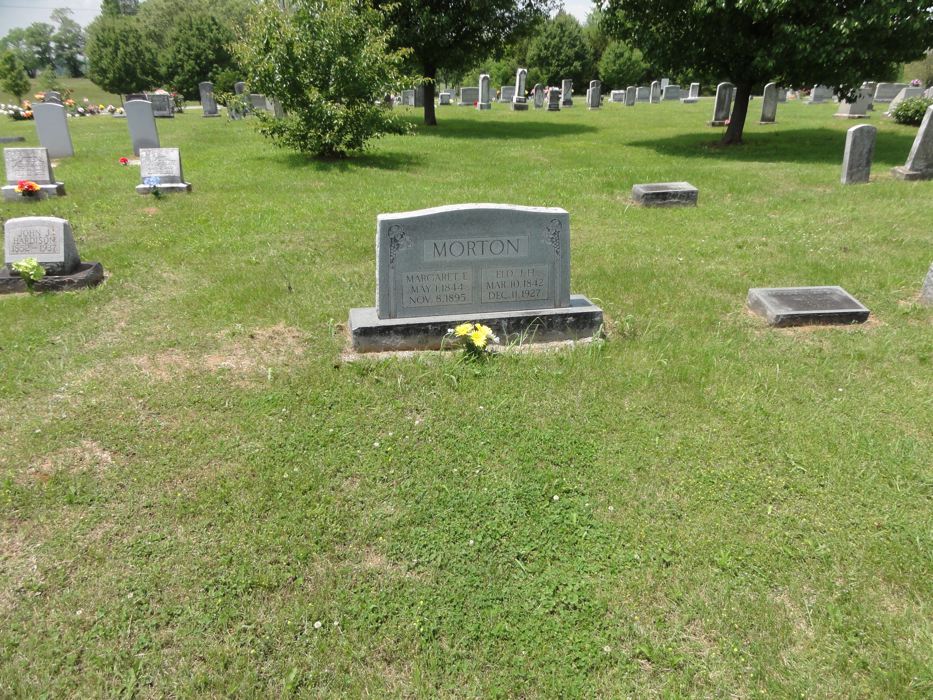
Joel Hardison plot is above Morton plot, and to the left of the peach tree behind
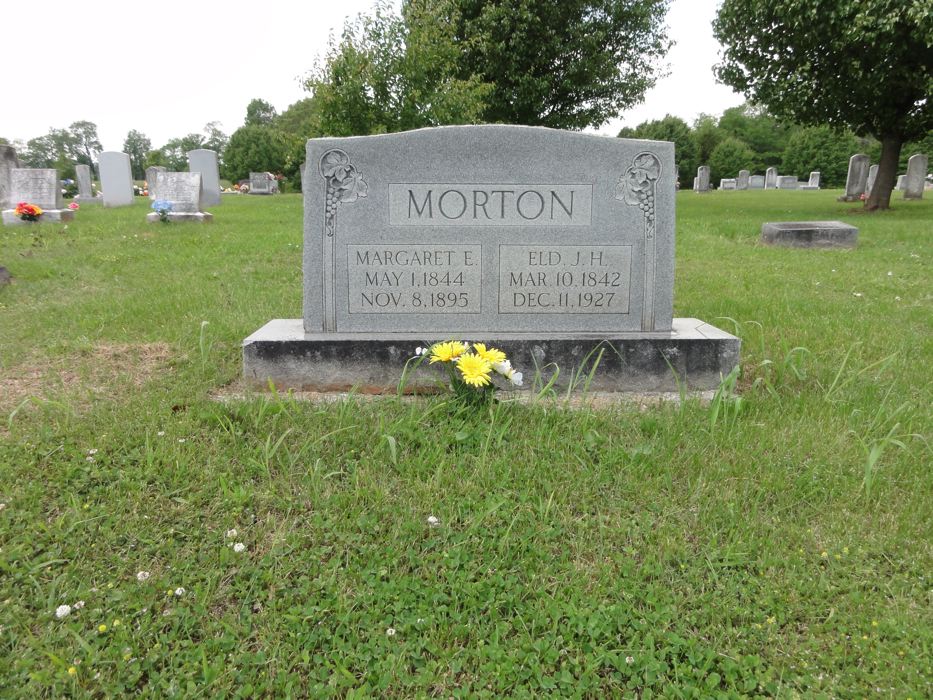
Morton
Margaret E.
May 1, 1844
November 8, 1895
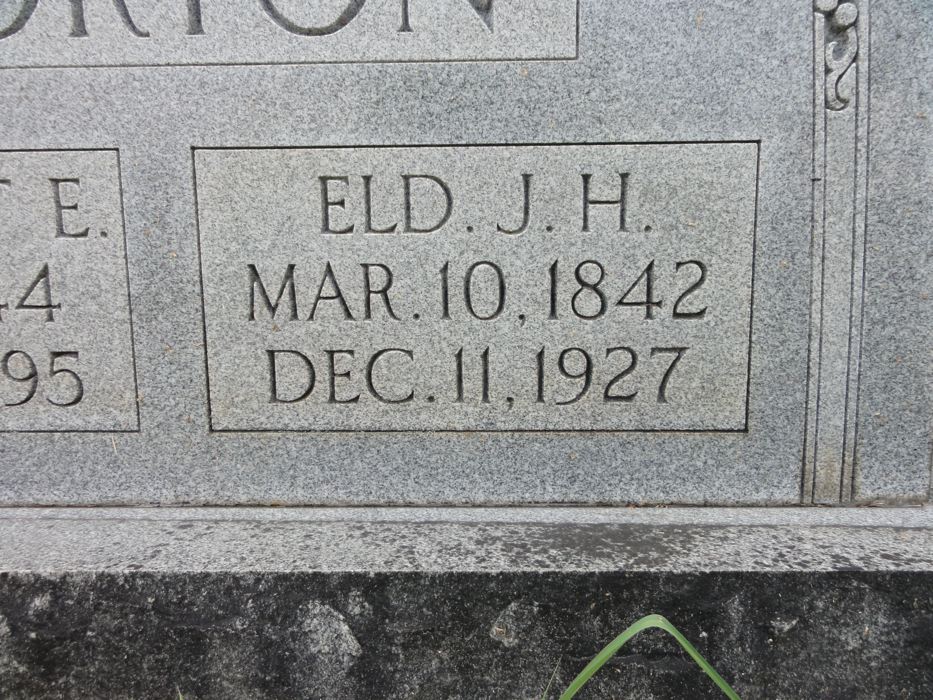
Eld. J. H.
March 10, 1842
December 11, 1927
![]()
